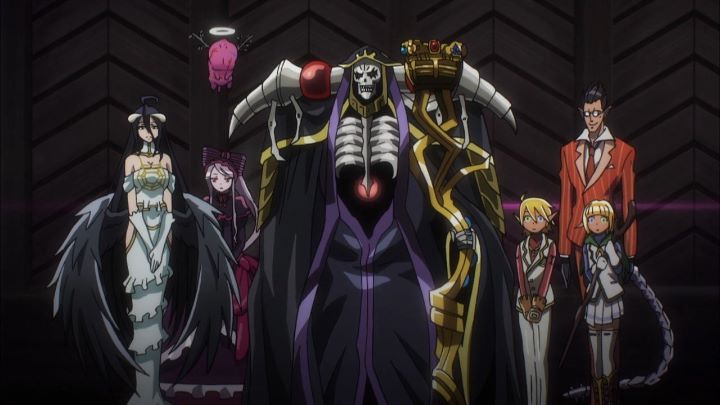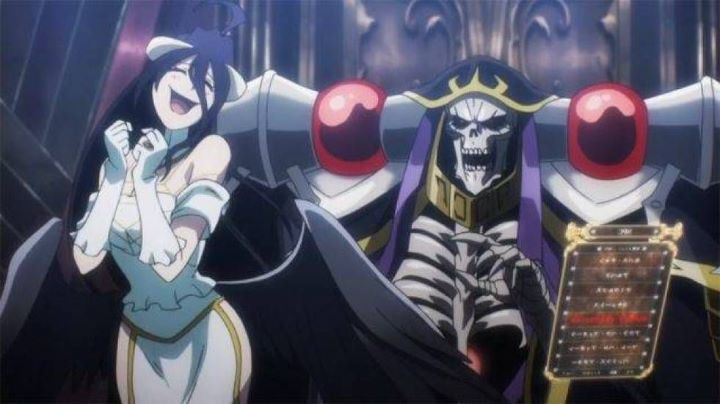








Disclaimer: This review covers Season 1 (episodes 1 - 13) of the anime "Overlord."As far as hit long-running anime in the 2010's goes, there aren't many that can stand up against "Overlord." Based on a series of Japanese novels, it is, at the time of this writing (2020), still ongoing, both in light novel, manga, and anime form (the anime is now past a third season). No doubt the average fan will at least have come across some of the novel covers, beautifully illustrated by artist "so-bin," whose art would also be used for home-video covers and concept art of the anime. Seriously, if ever an artbook compliation is released, of his painterly gothic nightmares, and NOT the comparatively average and simplified anime character designs, I'd pre-order it in an instant. Anyway, "Overlord" follows the trend of the decade: "isekai," the genre where some modern dude gets whisked away to a magical fantasy world, often inspired by a video game, and is forced to live and fight his way through this opportune rebirth. The anime introduces us to the video game first, an online game called "Yggdrasil," which, after over a decade of operation, is about to shut down. As the game clock counts down, an skeletal demon avatar named Momonga is one of the final players, having just bid farewell to his online friends who have, just now or in years past, logged off to continue their real lives. Left alone in the grand castle his guild spent years building, he can't help but be saddened to see the world go, and stays, as if waiting for the world's impending death, in "3... 2... 1..."But the clock continues. And Momonga realizes his GUI is gone, and that the NPC's seem more real than they were previously. This isn't a game anymore, and even if it was, there isn't any clear way for him to log out. Assessing the situation, he plays along, deciding to rule the NPC minions of his castle under the new name of Lord Ainz Ooal Gown, named after his guild. He'll use his power to explore the new world (outside the castle, the surrounding lands appear to have drastically changed or randomized), and perhaps conquer it as well, not just for fun, but "to spread his name," such that if he isn't the only human player stuck in the world, than surely another will find him. This is a convenient way to setup the premise: not only is the main character stuck in a fantasy video-game, but he's also the "bad guy." The role is loosely defined: Ainz looks and sounsd fearsome and intimidating, and his loyal demon NPC's are happy to kill off legions of humans, but Ainz is still internally sympathetic and does the right thing, saving helpess human villagers more often than hurting them. Either because of his appearance, or because of some other internal desires, Ainz does slowly give in to his darker personality, either by asking for compensation (a saved village is less suspicious if they understand he saved them for personal gain), or by making decisions solely for his goal of spreading his in-game fame (like preparing to kill a legendary forest guardian, even it it means risking the lives in the village it protects). Even if we understand him, this anti-hero journey is part of the fun, even if it isn't explored excessively within the first season.  Beyond Ainz, we get the sense that he is simply an actor in a much larger play, as the story focuses more heavily on the culture and lives of others, be it mercenary adventurers or an evil mage seeking to raise an army of the undead. One could argue this isn't as interesting or as fun as watch Ainz and his minions, but it is engaging nonetheless, and helps to stretch out the story without feeling any tedium towards the main characters. Of course, Ainz and his NPC minions are massively overpowered, having reached unheard-of levels over the course of many years. Even though they try to hide their full strength to not scare off others, they occasionally meet a confident foe that requires Ainz to beat them with a single magic spell, or in a Black-Knight form that hides his skull-face, with two massive swords. Ainz and his gang are badasses, and it's incredibly satisfying to see them fight, especially when coupled with Ainz' in-game deep voice talking down to the victim he's about to kill. The English dub acting doesn't work well everywhere, but it's fantastic in the most important characters, and spot-on writing makes it extra juicy (perhaps easier here, since Ainz's mouth doesn't move to worry about lip-flapping). That sums up what watching "Overlord" is like: the story isn't much to write home about, but it's great fun to watch, well-suited for television or for binge-watching (I managed to watch the whole thing in one sitting, which is rare for me). The show isn't just dark fantasy-thriller either, taking many opportunities to throw in some light-hearted humor to offset some surprisingly gruesome violence. Visually, studio Madhouse did a decent effort with "Overlord," even though it isn't their best, and even though it pales in comparison to the official concept art by the original illustrator. Even simplified for animation, you do get complex and distinct character designs, all of which are memorable and interesting, even if some are a little silly, as if designed by some teenage otaku developing an indie-game in his basement (which, honestly, is how a lot of video games get made). Animation is reasonable too, even though the show relies heavily on 3D CGI for any characters and enemies that aren't organic (think undead skeletons or meta-physical dragons); the CGI is used in smart ways though, and allows for a couple impressive fight scenes. I wasn't a fan of the metal-rock opening and ending themes at first, but I got used to it as an important part of the show's personality. I've only seen the first season, and I mentioned "Overlord" is still ongoing, with no end in the near future. I don't think I'll bother to continue watching, as there's simply too much else to watch. But I COULD. "Overlord" earns its popularity, a darkly fun take on an overpopulated anime genre.
Beyond Ainz, we get the sense that he is simply an actor in a much larger play, as the story focuses more heavily on the culture and lives of others, be it mercenary adventurers or an evil mage seeking to raise an army of the undead. One could argue this isn't as interesting or as fun as watch Ainz and his minions, but it is engaging nonetheless, and helps to stretch out the story without feeling any tedium towards the main characters. Of course, Ainz and his NPC minions are massively overpowered, having reached unheard-of levels over the course of many years. Even though they try to hide their full strength to not scare off others, they occasionally meet a confident foe that requires Ainz to beat them with a single magic spell, or in a Black-Knight form that hides his skull-face, with two massive swords. Ainz and his gang are badasses, and it's incredibly satisfying to see them fight, especially when coupled with Ainz' in-game deep voice talking down to the victim he's about to kill. The English dub acting doesn't work well everywhere, but it's fantastic in the most important characters, and spot-on writing makes it extra juicy (perhaps easier here, since Ainz's mouth doesn't move to worry about lip-flapping). That sums up what watching "Overlord" is like: the story isn't much to write home about, but it's great fun to watch, well-suited for television or for binge-watching (I managed to watch the whole thing in one sitting, which is rare for me). The show isn't just dark fantasy-thriller either, taking many opportunities to throw in some light-hearted humor to offset some surprisingly gruesome violence. Visually, studio Madhouse did a decent effort with "Overlord," even though it isn't their best, and even though it pales in comparison to the official concept art by the original illustrator. Even simplified for animation, you do get complex and distinct character designs, all of which are memorable and interesting, even if some are a little silly, as if designed by some teenage otaku developing an indie-game in his basement (which, honestly, is how a lot of video games get made). Animation is reasonable too, even though the show relies heavily on 3D CGI for any characters and enemies that aren't organic (think undead skeletons or meta-physical dragons); the CGI is used in smart ways though, and allows for a couple impressive fight scenes. I wasn't a fan of the metal-rock opening and ending themes at first, but I got used to it as an important part of the show's personality. I've only seen the first season, and I mentioned "Overlord" is still ongoing, with no end in the near future. I don't think I'll bother to continue watching, as there's simply too much else to watch. But I COULD. "Overlord" earns its popularity, a darkly fun take on an overpopulated anime genre.